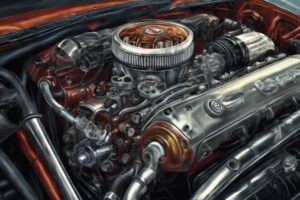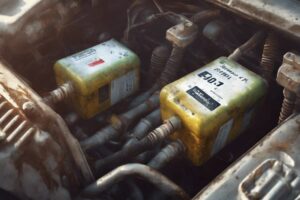If your vehicle shows engine misfires, rough idling, poor acceleration, increased fuel consumption, decreased power, or potential engine issues, your fuel injectors may be the culprits. Misfires cause sputtering and poor speed. Rough idling leads to unstable engine RPMs. Poor acceleration means delayed responses. Higher fuel usage results from incorrect fuel amounts. Decreased power hampers acceleration. Explore further to diagnose and repair these issues for peak vehicle performance.
Key Takeaways
- Engine misfires indicate bad fuel injectors, causing sputtering and poor acceleration.
- Rough idling suggests injector issues, leading to unstable RPMs and potential stalling.
- Poor acceleration results from bad injectors, causing delays and reduced power output.
- Increased fuel consumption due to bad injectors leads to higher costs and inefficiency.
- Decreased power from faulty injectors causes sluggishness, hindering performance and fuel efficiency.
Engine Misfires

If your engine is experiencing misfires, it could be a sign of bad fuel injectors causing sputtering and poor acceleration. Misfires can lead to vibrations in your car while driving, indicating potential issues with the fuel injectors. To troubleshoot this, you may need to inspect your spark plugs for any signs of damage or wear. Furthermore, performing ignition system diagnostics can help pinpoint the exact cause of the misfires, allowing for targeted maintenance.
When faced with engine misfires, it's important to check for any spark plug issues that could be exacerbating the problem. Ignition system diagnostics play a key role in identifying and addressing these issues effectively. By maintaining your ignition system through regular checks and necessary maintenance, you can prevent misfires caused by bad fuel injectors. Addressing these issues promptly can greatly improve your engine's performance and overall driving experience.
Rough Idling
Experiencing rough idling in your vehicle could indicate potential issues with the fuel injectors, leading to unstable engine RPMs. When your engine idles roughly, it may sputter, vibrate, or even stall, causing inconvenience and potential safety hazards.
To diagnose rough idling, start by checking for any visible signs of fuel leaks around the injectors. Perform idling diagnostics using a scan tool to identify specific cylinder misfires that could be linked to faulty injectors. Unbalanced fuel delivery from bad injectors can disrupt the engine's smooth operation, affecting overall performance.
To address rough idling, consider regular fuel injector maintenance. Cleaning or replacing clogged or malfunctioning injectors can improve fuel atomization, promoting better combustion and smoother idling. Timely maintenance can prevent further engine damage and ensure top-notch performance.
If left unattended, rough idling can escalate into more severe issues like poor acceleration and decreased fuel efficiency. By staying proactive with idling diagnostics and fuel injector maintenance, you can enhance your vehicle's reliability and driving experience.
Poor Acceleration

Poor acceleration is a common indication of bad fuel injectors, resulting in a lack of sufficient fuel delivery to the engine. When your fuel injectors aren't functioning correctly, it can lead to various acceleration issues that impact your driving experience.
Here are some effects of poor acceleration due to bad fuel injectors:
- Delayed Response: Bad fuel injectors may cause a delay in response when you press the accelerator, affecting the vehicle's overall performance.
- Reduced Power Output: Engine efficiency can be compromised, leading to reduced power output during acceleration, which is vital for a smooth drive.
- Hesitation and Sluggishness: Faulty fuel injectors can result in engine hesitation or sluggishness when accelerating, affecting combustion processes.
- Decreased Speed: Acceleration speed and responsiveness may decrease significantly, making it challenging to accelerate quickly when needed.
- Impact on Fuel Efficiency: Poor acceleration due to bad fuel injectors can also affect fuel efficiency, causing you to consume more fuel than usual.
If you notice these signs of poor acceleration, it's essential to have your fuel injectors inspected and repaired to guarantee performance and fuel economy.
Increased Fuel Consumption
Bad fuel injectors can greatly affect your vehicle's fuel consumption by delivering an incorrect amount of fuel to the engine. When fuel injectors go bad, they may spray too much or too little fuel into the combustion chamber, leading to inefficient burning of fuel. This inefficiency can result in increased fuel consumption, causing you to make more frequent trips to the gas station and incur higher fuel costs. Dirty or clogged fuel injectors can disrupt the best fuel-air ratio needed for efficient combustion, further exacerbating the problem of increased fuel usage.
To improve fuel efficiency and address issues related to bad fuel injectors, consider implementing fuel efficiency tips such as maintaining a steady speed while driving, avoiding aggressive acceleration and braking, and keeping up with regular vehicle maintenance, including fuel injector maintenance. Regular maintenance can involve cleaning or replacing fuel injectors as needed to guarantee they deliver the correct amount of fuel to the engine, thereby optimizing fuel consumption. By monitoring changes in fuel consumption and promptly addressing any issues with fuel injectors, you can help improve your vehicle's efficiency and reduce unnecessary fuel expenses.
Decreased Power

When fuel injectors start causing decreased power in your vehicle, you may notice sluggish acceleration and reduced engine performance. This drop in power can have a substantial impact on your driving experience and overall vehicle performance.
Here are some effects of decreased power due to bad fuel injectors:
- Sluggish Acceleration: The vehicle may struggle to pick up speed as quickly as before, making overtaking or merging onto highways more challenging.
- Reduced Engine Performance: The engine may feel underpowered and lack the usual responsiveness, affecting the overall driving dynamics.
- Difficulty Climbing Inclines: Uphill driving may become more laborious as the engine fails to deliver the necessary power.
- Impact on Performance Tuning: Bad fuel injectors can hinder any performance tuning efforts, limiting the enhancements you can make to your vehicle.
- Decreased Fuel Efficiency: Reduced power output can lead to inefficient fuel combustion, affecting fuel efficiency and increasing overall running costs.
Addressing bad fuel injectors promptly is essential not only to restore power but also to maintain performance tuning efforts and fuel efficiency in your vehicle.
Potential Engine Damage
Experiencing issues with your fuel injectors can potentially lead to significant engine damage. Bad fuel injectors can disrupt the proper air-fuel ratio, impacting engine performance, fuel economy, and emissions control.
When fuel injectors fail, they may cause lean or rich fuel mixtures, leading to overheating and premature wear of engine components. Engine misfires resulting from bad fuel injectors can lead to damage to important parts such as pistons, valves, and the catalytic converter, affecting the overall performance of your vehicle.
Poor fuel atomization due to faulty injectors can result in incomplete combustion, leading to carbon buildup and potential damage to engine components over time. Moreover, unbalanced fuel delivery from bad injectors can cause cylinder misfires, impacting engine efficiency and causing long-term harm.
It's important to address fuel injector issues promptly to prevent further engine damage and maintain peak performance, fuel economy, and emissions control.
As an Amazon Associate we earn from qualifying purchases.










